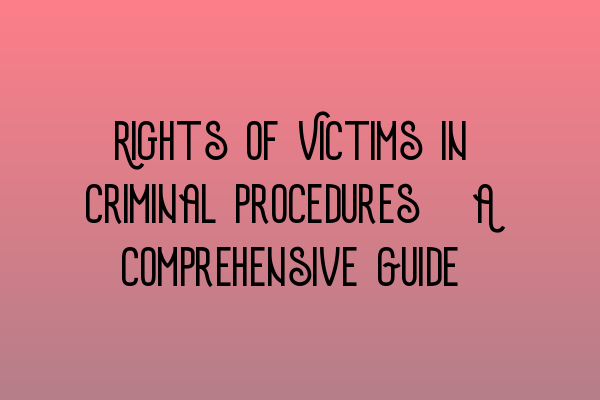Rights of Victims in Criminal Procedures: A Comprehensive Guide
As a victim of a crime, you have certain rights that are protected by law. Understanding these rights is crucial in ensuring your involvement and participation in the criminal justice process. This comprehensive guide aims to shed light on the rights of victims in criminal procedures, empowering you with the knowledge you need to navigate through this often complex and challenging journey.
1. Right to be Informed
One of the fundamental rights of a victim is the right to be informed about the progress of the case. This includes being notified about court proceedings, the arrest and release of the accused, and any important updates related to the investigation.
It is essential to stay informed throughout the process, as this allows you to actively participate and make informed decisions about your involvement in the proceedings.
If you want to learn more about the SQE 1 Practice Mocks FLK1 and FLK2, click here.
2. Right to Be Heard
Your voice matters. The criminal justice system recognizes your right to be heard during the proceedings. This means you have the opportunity to provide a victim impact statement, share your concerns, and express your views regarding the case.
Your input can have a significant impact on the outcome of the case, and it is important to exercise this right to ensure your interests are properly represented.
3. Right to Protection
Your safety and well-being should be a top priority. The law grants you the right to protection throughout the criminal procedures. This includes measures such as restraining orders, if necessary, to prevent any contact between you and the accused.
If you feel threatened or unsafe at any point, it is crucial to report it to the authorities and seek appropriate protective measures.
If you are looking for SQE 2 preparation courses, you can find more information here.
4. Right to Support and Compensation
As a victim, you have the right to receive support throughout the criminal justice process. This can include emotional support, access to counseling services, and assistance in understanding and exercising your rights.
In addition, if you have suffered any physical, emotional, or financial harm as a result of the crime, you may be eligible for compensation. It is important to consult with legal professionals to explore your options and ensure you receive the support and compensation you are entitled to.
5. Right to Privacy
Your privacy should be respected and protected. As a victim, you have the right to privacy during the criminal procedures. This includes safeguarding your personal information and preventing unnecessary disclosure that may interfere with your well-being or compromise your safety.
For SQE 1 preparation courses, visit our website here.
6. Right to Restitution
If you have suffered financial losses due to the crime, you have the right to seek restitution. This means that the offender may be required to compensate you for the damages and losses you have incurred.
It is important to consult with legal professionals to understand the process and to advocate for your right to restitution.
If you are interested in knowing the SRA SQE Exam Dates, you can find them here.
Understanding your rights as a victim is crucial in navigating through the criminal justice system. If you want to learn more about the legal aspects of criminal procedures and explore SQE 1 practice exam questions, click here.
Remember, you have the right to be informed, heard, protected, and supported throughout the criminal proceedings. Empower yourself with knowledge and seek legal guidance to ensure your rights are upheld.
